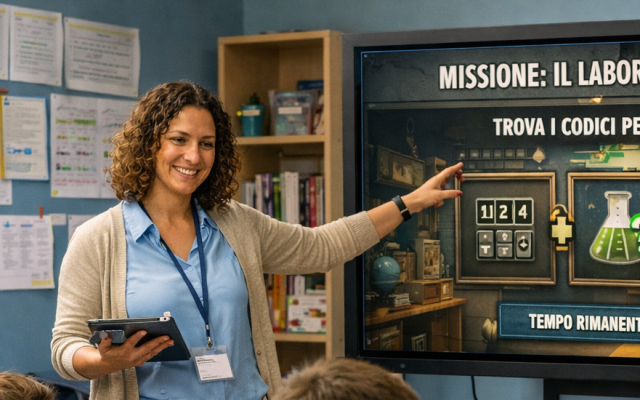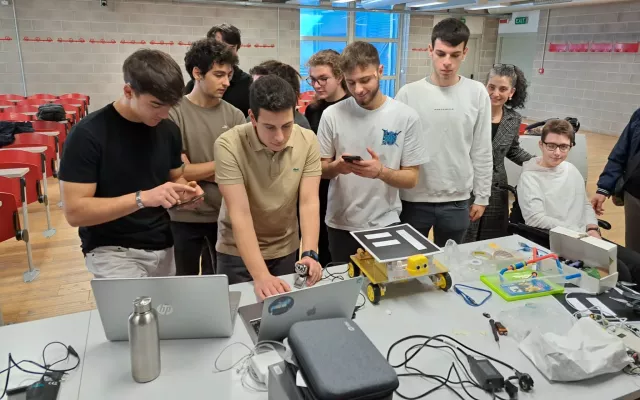Ital.IA Lab for School: towards an ethical and inclusive use of artificial intelligence
The first face-to-face training courses held at the G. Giorgi technical and technological institute in Brindisi, led by headteacher Mina Fabrizio, confirm the vision of Ital.IA Lab for School: a project that stems from co-design with schools, listens to the needs of local areas and offers flexible modules that can be immediately applied in the classroom. The aim is to support teachers in developing solid AI literacy skills and to guide schools towards the informed adoption of artificial intelligence, reducing educational gaps and enhancing educational communities. The testimony of Professor Antonio Bari fully reflects the spirit of Ital.IA Lab for School: getting involved, sharing good practices and accompanying students in a digital transition that is responsible, inclusive and future-oriented.
Professor, what motivated you to participate in the Ital.IA Lab for School training?
My main motivation for participating in the Ital.IA Lab for School training was the desire to understand how to integrate artificial intelligence tools into teaching in an informed, ethical and effective way. I felt the need to explore new methodologies and acquire practical ideas to help students develop a critical and creative approach to AI, preparing them for a constantly evolving context. I also believe it is essential that we teachers are the first to get involved, experimenting and updating our skills. This is another reason why I promoted the extension of this training activity to all my colleagues, in the belief that the informed use of these tools can provide concrete support to students and accompany them with greater confidence and authority towards the future.
What were your expectations before the course and how were they confirmed or exceeded?
Before starting this course, I expected to gain a clearer understanding of artificial intelligence applied to schools, especially from a didactic and methodological point of view. I hoped to find concrete tools, applicable and replicable examples, and useful reflections on how to guide students towards critical and responsible use. I can say that these expectations were confirmed and the training offered practical ideas that could be used immediately, opportunities for discussion and a broader view of the impact of AI on learning processes. I particularly appreciated the experimentation-oriented approach.
What aspect of the training did you find most useful for your daily teaching practice?
The aspect I found most useful was the extremely practical nature of the training. Not only did we explore how the tools work, but we also saw how to integrate them into the classroom in a concrete way, with replicable activities and immediate teaching strategies in the three examples proposed by the speaker.
Is there a concept, technique or tool that you were “unfamiliar with” and now feel confident using?
Rather than discovering completely new tools, the training taught me how to use them with greater teaching awareness. I was already experimenting with AI, but now I feel more confident in designing structured activities, guiding students towards critical use and defining more effective teaching scenarios. In particular, I have strengthened my ability to integrate these tools into my lessons with clear objectives, assessment criteria and a focus on ethics and inclusion.
Do you already have an idea of how to incorporate the practical activities or teaching sheets into your lessons?
I don't yet have a clear idea of how to incorporate the practical activities or teaching sheets into my lessons, but it has been very useful to receive this input. The training gave me concrete ideas and inspiration that will certainly guide future planning, helping me to integrate AI in a more structured and conscious way into everyday teaching and the civic education curriculum.
How important do you think it is today for teachers to develop AI literacy skills?
I believe it is essential for teachers to develop AI literacy skills because AI is becoming an increasingly important part of everyday life, especially in schools. Understanding AI and knowing how to use it critically enables teachers to guide students towards the informed, creative and ethical use of digital tools. For us teachers, this also means constantly updating our knowledge, experimenting with new methodologies and preparing students with skills that are truly useful for the present and the future.
Have you noticed a change in your colleagues' attitudes towards AI after the training?
Yes, I have noticed a positive change in my colleagues' attitudes. At first, some were a little sceptical, doubting the practicality or added value of AI in teaching, and approached it out of pure curiosity. But after the Ital.IA Lab for School training course, many showed greater openness and awareness, and the fact that they received concrete tools and an initial context for discussion helped them move from a wait-and-see position to a more active one.
If you could make a wish for the next activities of the project, what would it be?
For the next activities of the project, it would be desirable to give continuity to the programme, with further training opportunities and practical experimentation with interactive laboratories or specific workshops for different disciplines. It would be important to keep the stimuli and moments of discussion between teachers alive, and I would also like to see concrete examples of classroom activities and good practices shared among teachers, so as to build a true learning community on the conscious use of AI in teaching.
If you had to describe in one sentence what you take away from this experience, what would you say?
I take with me the awareness that AI can become an ally in teaching, and the motivation to experiment, innovate and guide students with new, critical and creative tools towards the future.

Interview by Alberta Testa, social media manager



